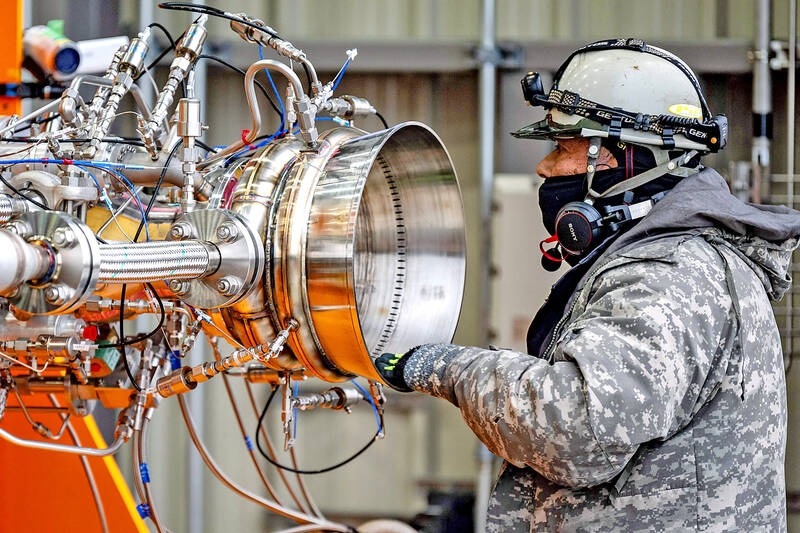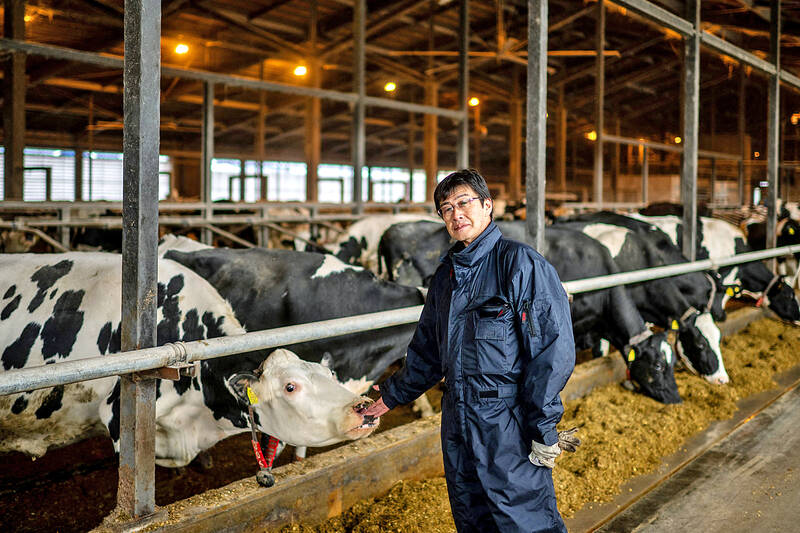Japan’s space industry on Thursday potentially opened an udder-ly new chapter with a start-up testing a prototype rocket engine that runs on fuel derived purely from a plentiful local source: cow dung.
The experiment saw the engine blast out a blue-and-orange flames 10m to 15m horizontally out of an open hangar door for about 10 seconds in the rural northern town of Taiki.
The liquid “biomethane” required was made entirely from gas derived from cow manure from two local dairy farms, Interstellar Technologies Inc CEO Takahiro Inagawa said.

Photo: AFP
“We are doing this not just because it is good for the environment, but because it can be produced locally, it is very cost effective, and it is a fuel with high performance and high purity,” Inagawa said.
“I do not think it is an exaggeration to assume this will be replicated … all over the world,” he said. “We are the first private business to do this.”
Interstellar, which hopes to be able to put satellites in space using the fuel, teamed up with industrial gas producer firm Air Water Inc.

Photo: AFP
It works with local farmers who have equipment on their farms to process their cow dung into biogas which Air Water collects and turns into the rocket fuel.
Resource-poor Japan “must secure domestically produced, carbon-neutral energy now,” Air Water engineer Tomohiro Nishikawa said.
“The raw material from this region’s cows has so much potential. Should something change in international affairs, it’s important that Japan has an energy source that it has already in hand,” he added.
Japan Aerospace Exploration Agency (JAXA) in September launched its “Moon Sniper” mission, but the sector has in the past few years been plagued by problems, with two failed missions — one public and one private.
Japan has also had setbacks with its launch rockets, with mishaps after liftoff of the next-generation H3 in March and the normally reliable solid-fuel Epsilon in October last year.
In July, the test of an Epsilon S rocket, an improved version of the Epsilon, ended in an explosion 50 seconds after ignition.
Biogas derived from cow manure is already being used for fuel around the world, including to run buses in the Indian city of Indore, instead of more polluting conventional sources.
It helps mitigate the enormous environmental footprint of agriculture, which Greenpeace says is responsible for 14 percent of greenhouse gas emissions worldwide.
Burning biogas also releases greenhouse gases, but so does leaving it to degrade naturally, while runoff from farm animals pollutes waterways and soil.
Air Water’s biomethane is already being used by a local dairy and other factories, to heat local homes and to run trucks and ships as pilot programs.
Among participating local farmers is Eiji Mizushita, 58, who raises about 900 milk cows that collectively generate more than 36 tonnes of dung every day.
His farm has an industrial system to automatically collect the waste, ferment it, and turn it into biogas, fertilizer and recycled bedding materials for his animals.
Sales of biogas expands Mizushita’s income by about 1 percent, but he said the effort is worth it.
“I’m excited to think that our cow waste could be used to make it fly,” he said of the rocket.
“We need to properly dispose of and use manure. I also think that the government and society should take a more serious look at the importance of natural renewable energy and encourage its production,” Mizushita said.

Semiconductor shares in China surged yesterday after Reuters reported the US had ordered chipmaking giant Taiwan Semiconductor Manufacturing Co (TSMC, 台積電) to halt shipments of advanced chips to Chinese customers, which investors believe could accelerate Beijing’s self-reliance efforts. TSMC yesterday started to suspend shipments of certain sophisticated chips to some Chinese clients after receiving a letter from the US Department of Commerce imposing export restrictions on those products, Reuters reported on Sunday, citing an unnamed source. The US imposed export restrictions on TSMC’s 7-nanometer or more advanced designs, Reuters reported. Investors figured that would encourage authorities to support China’s industry and bought shares

FLEXIBLE: Taiwan can develop its own ground station equipment, and has highly competitive manufacturers and suppliers with diversified production, the MOEA said The Ministry of Economic Affairs (MOEA) yesterday disputed reports that suppliers to US-based Space Exploration Technologies Corp (SpaceX) had been asked to move production out of Taiwan. Reuters had reported on Tuesday last week that Elon Musk-owned SpaceX had asked their manufacturers to produce outside of Taiwan given geopolitical risks and that at least one Taiwanese supplier had been pushed to relocate production to Vietnam. SpaceX’s requests place a renewed focus on the contentious relationship Musk has had with Taiwan, especially after he said last year that Taiwan is an “integral part” of China, sparking sharp criticism from Taiwanese authorities. The ministry said

US President Joe Biden’s administration is racing to complete CHIPS and Science Act agreements with companies such as Intel Corp and Samsung Electronics Co, aiming to shore up one of its signature initiatives before US president-elect Donald Trump enters the White House. The US Department of Commerce has allocated more than 90 percent of the US$39 billion in grants under the act, a landmark law enacted in 2022 designed to rebuild the domestic chip industry. However, the agency has only announced one binding agreement so far. The next two months would prove critical for more than 20 companies still in the process

CHANGING JAPAN: Nvidia-powered AI services over cellular networks ‘will result in an artificial intelligence grid that runs across Japan,’ Nvidia’s Jensen Huang said Softbank Group Corp would be the first to build a supercomputer with chips using Nvidia Corp’s new Blackwell design, a demonstration of the Japanese company’s ambitions to catch up on artificial intelligence (AI). The group’s telecom unit, Softbank Corp, plans to build Japan’s most powerful AI supercomputer to support local services, it said. That computer would be based on Nvidia’s DGX B200 product, which combines computer processors with so-called AI accelerator chips. A follow-up effort will feature Grace Blackwell, a more advanced version, the company said. The announcement indicates that Softbank Group, which until early 2019 owned 4.9 percent of Nvidia, has secured a